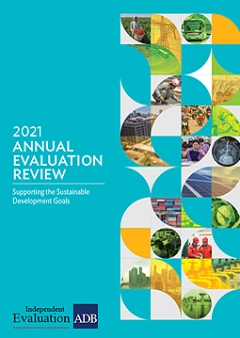
2021 Annual Evaluation Review: Supporting the Sustainable Development Goals
The rapid spread of the coronavirus disease (COVID-19) in 2020, the largest pandemic in more than a century, triggered severe public health and economic crises across the world including in Asian Development Bank’s (ADB) member countries. Over the course of the year, ADB’s dominant operations focused on crisis response, supporting its member countries contain the spread of the disease and protect the vulnerable. Against this backdrop, this Annual Evaluation Review (AER) updates ADB’s performance and results from a high-level perspective, based on findings and evidence from Independent Evaluation Department (IED) evaluations and validations, and assesses ADB’s institutional response and support for the Sustainable Development Goals (SDGs) and how the pandemic may affect them.
ADB response to the COVID-19 pandemic has been fast and comprehensive and has contributed to meeting member countries’ needs for urgent assistance so far. ADB swiftly mobilized resources to deliver assistance for social protection, health, and macroeconomic stability to minimize loss of life, protect the poor and vulnerable, and mitigate economic hardship. During the year, ADB also launched an independent evaluation system to validate completion reports for its large technical assistance (TA) program, becoming only the second multilateral development bank after the International Finance Corporation to systematically assess the performance of TA projects.
With respect to sovereign operations, while efficiency maintained a significant long-term improving trend, project success rate has been declining for the past two consecutive 3-year periods, driven by declining effectiveness. In the nonsovereign sector, financial institutions and private equity funds continue to underperform. This report delivers an integrated analysis drawing from IED sector-wide evaluations of energy; transport; and agriculture, natural resources, and rural development. The report observes that performance in the three sectors was largely positive in addressing poverty and inequalities and in promoting gender equality but relatively weak in tackling climate change, environmental issues, and in strengthening governance and institutional capacity. At the same time, concerning sector work, serious challenges need to be addressed to achieve the quantitative targets of Strategy 2030 on private sector operations. The success of the examined sector programs was affected by gaps in sector guidance and knowledge sharing. ADB needs to strengthen efforts to develop and implement sector frameworks that improve sector guidance, clarify the links between sector work and thematic approaches, and enhance knowledge sharing andcollaboration.
The pandemic’s unprecedented impact on the economies and health systems of ADB member countries is likely to derail progress toward achieving the SDGs. While ADB’s institutional tools and approaches are adequately aligned to the SDGs, this institutional alignment has yet to fully reach country or project levels. Country ownership of the SDGs varies across member countries, and a perception within ADB thatall operations contribute to the SDGs, impedes ADB’s country- and project-level engagement on the SDGs. With 10 years left to achieve the SDGs by 2030, a more concerted effort among development partners will be needed to help countries attain the SDGs. ADB must also continue leveraging its existing partnerships with development organizations to address the SDG data and financing gaps exacerbated by the pandemic. The potential for a green recovery within the SDG framework should be prioritized.


